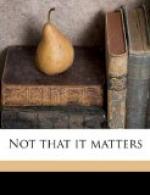But now he is leaving us. Where he goes I know not, but I think of him vaguely as at Mozambique, a paradise for all good birds who like their days long. If geography were properly taught at schools, I should know where Mozambique was, and what sort of people live there. But it may be that, with all these cuckoos cuckooing and swallows swallowing from July to April, the country is so full of immigrants that there is no room for a stable population. It may also be, of course, that Mozambique is not the place I am thinking of; yet it has a birdish sound.
The year is arranged badly. If Mr. Willett were alive he would do something about it. Why should the days begin to get shorter at the moment when summer is fully arrived? Why should it be possible for the vicar to say that the evenings are drawing in, when one is still having strawberries for tea? Sometimes I think that if June were called August, and April June, these things would be easier to bear. The fact that in what is now called August we should be telling each other how wonderfully hot it was for October would help us to bear the slow approach of winter. On a Midsummer Day in such a calendar one would revel gladly, and there would be no midsummer madness.
Already the oak trees have taken on an autumn look. I am told that this is due to a local irruption of caterpillars, and not to the waning of the summer, but it has a suspicious air. Probably the caterpillars knew. It seems strange now to reflect that there was a time when I liked caterpillars; when I chased them up suburban streets, and took them home to fondle them; when I knew them all by their pretty names, assisted them to become chrysalises, and watched over them in that unprotected state as if I had been their mother. Ah, how dear were my little charges to me then! But now I class them with mosquitoes and blight and harvesters, the pests of the countryside. Why, I would let them crawl up my arm in those happy days of old, and now I cannot even endure to have them dropping gently into my hair. And I should not know what to say to a chrysalis.
There are great and good people who know all about solstices and zeniths, and they can tell you just why it is that 24th June is so much hotter and longer than 24th December—why it is so in England, I should say. For I believe (and they will correct me if I am wrong) that at the equator the days and nights are always of equal length. This must make calling almost an impossibility, for if one cannot say to one’s hostess, “How quickly the days are lengthening (or drawing in),” one might as well remain at home. “How stationary the days are remaining” might pass on a first visit, but the old inhabitants would not like it rubbed into them. They feel, I am sure, that however saddening a Midsummer Day may be, an unchanging year is much more intolerable. One can imagine the superiority of a resident who lived a couple of miles off the equator, and took her visitors proudly to the end of the garden where the seasons were most mutable. There would be no bearing with her.




